101+ VEGAN GROCERY LIST ITEMS TO GET TODAY (WITH DISCOUNTS)!
Whether you’re new to being vegan or shopping for that special vegan in your life, here are 101+ must-have vegan grocery list items (with brand/grocery delivery discounts linked below) to get you started down the right path to eating healthy, whole, and delicious plant-based foods from your local grocery store.
Note that there are affiliate links in this article that will enable you to get a discount while I’ll earn a commission. Any sponsored brands or affiliate partnerships are companies and products that I’ve personally tried and vetted. These collaborations allow me to run this blog and keep my in-depth content free of charge for readers like you who want to learn more about vegan living 🙂
Now, without further ad0, let’s get straight into the good stuff:
101+ Vegan Grocery List Items to Get Today
- What Do Vegans Eat?
- Which Foods Do Vegans NOT Eat?
- How Do Vegans Get Enough Protein?
- How to Create a Vegan Grocery List (101+ Items)
- Fruits (Fresh, Frozen and Dried)
- Vegetables (Fresh, Frozen and Canned)
- Nuts and Seeds
- Legumes (Dried and Canned)
- Grains
- Plant-Based Vegan Meat Alternatives
- Soy Products
- Dairy Alternatives (Vegan Cheeses and Milks)
- Breads and Pastas
- Condiments
- Herbs and Spices
- Beverages
- Snacks and Treats
Let’s dive in!
What Do Vegans Eat?
It may come as a surprise to some, but vegans eat very well today. Most vegan diets consist of a very wide range of nutritionally rich, tasty, and filling staples including fruits, vegetables, nuts, seeds, legumes, grains, plant-based vegan meat alternatives, dairy alternatives (like vegan cheeses and milks), pantry staples, breads, pastas, condiments, herbs and spices, beverages, snacks, and treats.
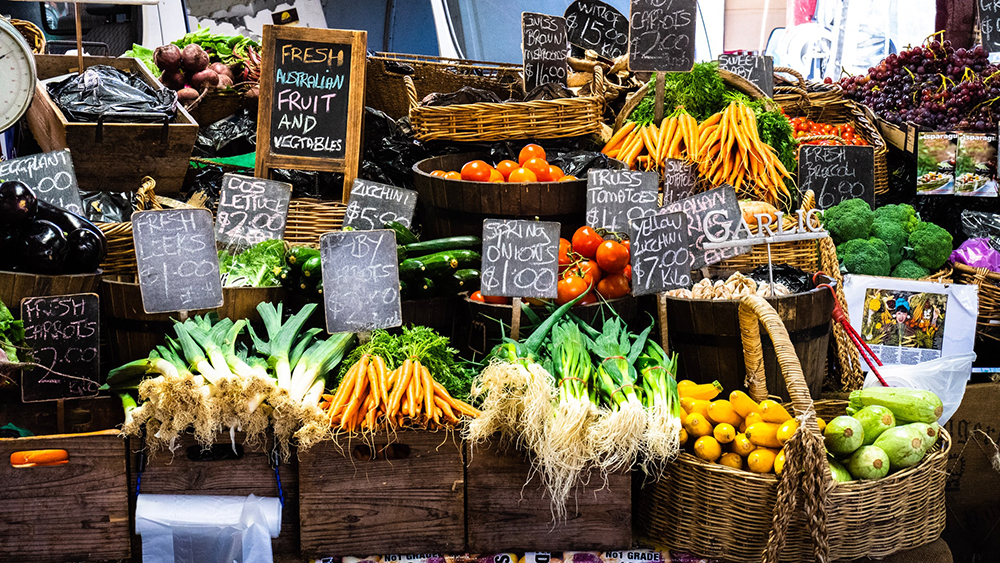
Far beyond just the fresh (organic, please!) produce you can get from a local farmer’s market, vegans have more options at their disposal today than ever before—making it that much easier to go vegan, regardless of your reasons.
Which Foods Do Vegans NOT Eat?
Whether for personal reasons, health motivations, nutritional choices, environmental concerns, animal rights, or otherwise, people who identify as being fully vegan do not eat any animal products or consume products that are derived from a process that negatively impacts animals. That includes things like:
- Meat (beef, pork, lamb, veal and other red meat)
- Poultry (chicken, turkey, duck, quail, etc.)
- Fish (all types of fish, anchovies, shrimp, scallops, calamari, mussels, crab, lobster, fish sauce, etc.)
- Dairy (milk, yogurt, cheese, butter, ice cream, etc.)
- Eggs (from chickens, quail, fish, etc.)
- Mayonnaise (because it includes egg yolk as a main ingredient)
- Honey (and other bee products like pollen)
Here’s where things get a little trickier as a vegan—a shocking number of food products you’ll find at your grocery store will have ingredients & components that include a product from one of the above categories. So, as you’re doing your shopping, get used to carefully reading the nutrition labels before placing something in your basket.
How Do Vegans Get Enough Protein?
Believe it or not, vegans get a lot of natural, clean protein in their diets. First and foremost, though, let’s define what a protein actually is. From the experts at Forks Over Knives, “Protein is one of three macronutrients our bodies use for energy (the other two macronutrients are carbohydrates and fat.) Protein is made up of 20 individual building blocks called amino acids. Amino acids are vital to our bodies—necessary for building and repairing cells, creating enzymes and antibodies, and performing other essential functions.”
Have you ever heard of someone having a ‘protein deficiency?’ Probably not, right? That’s because the vast majority of people get far more protein than they really need. Forks Over Knives also pointed to a study from the Journal of the Academy of Nutrition and Dietetics, which found that the average vegetarian and vegans get 70% more protein than they need every day, while omnivores get about 80% more protein than they need. The point being: the main nutritional concern people have with veganism surrounding a lack of protein is actually a non-issue.
In short, you can (and should) get all the protein you need simply by eating a predominantly whole-food, plant-based diet without putting any extra effort toward making sure you’re getting enough protein.
The main foods that have high concentrations of protein in a vegan diet include:
- Beans (including soybeans, tofu and tempeh)
- Lentils (and other legumes)
- Grains such as quinoa and bulgur (commonly used in tabouleh)
- Nuts and seeds
Beyond that, just about everything else in a plant-based (vegan) diet including grains and vegetables, with the exception of most fruit—will pack in a meaningful amount of protein, too.
The Best Vegan Protein Powders (with discounts)!
There are a ton of fantastic plant-based protein powders on the market (I should know, I’ve only tried about 700 of them)! My typical morning smoothie packs anywhere from 40-53g of protein once I add in yogurt, nut butter, hemp seeds, flaxseeds, and protein powder – it’s such a delicious, satisfying, and nourishing way to start my day and get a huge intake of protein in my first meal. Some of my favorite vegan protein powders:
- Spout Living has 26g protein per serving in their Original Unflavored powder – get 20% off your order of Sprout Living with code VEGANANJ20
- Earthchimp has 21g protein in their Plain and Unsweetened powder – get 10% off your order with code VEGANANJ
- Orgain Organic Protein has 21g protein and their Sport Protein has 30g – get 20% your first order of Orgain
- Tone it Up Vanilla Unsweetened Protein has 15g protein – use code TONEITUP10 for 10% off your order
How to Create a Vegan Grocery List (101+ Items)
Now, let’s dive into a list of items you can pick and choose from for your grocery shopping today. I primarily shop at my local farmer’s market, Whole Foods, Trader Joe’s and Thrive Market (discount below) but there’s also great vegan food to be found at Sprouts, Costco, Vons/Safeway/Pavillions, Gelson’s, Ralph’s, Target, Walmart, Amazon, and Instacart (also discounted below)!
Use this link for 30% off your purchase and a $60 FREE gift when you join Thrive Market
Use this link for 2 weeks of free delivery on Instacart
Fruits (Fresh, Frozen and Dried)
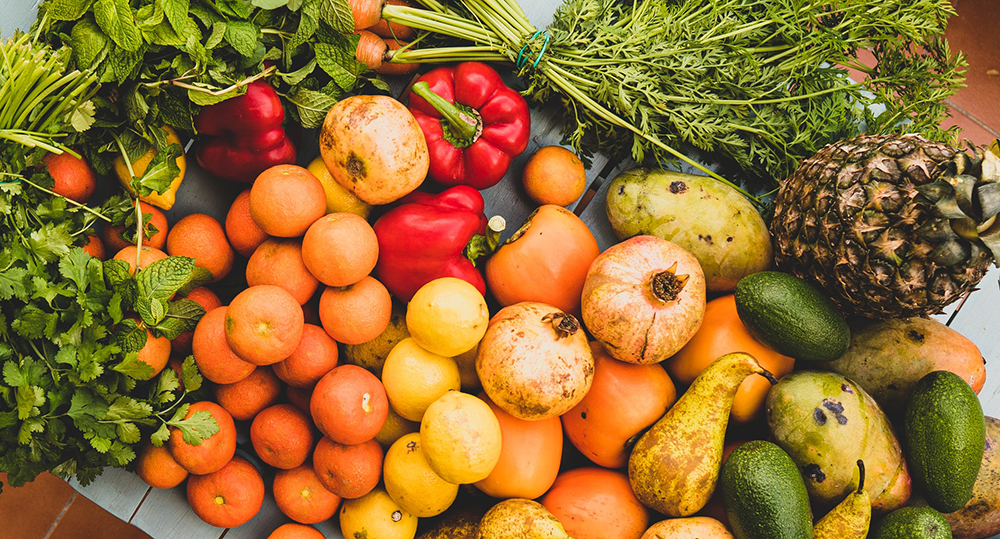
Fresh fruits to add to any essential vegan shopping list include:
- Bananas
- Strawberries
- Blueberries
- Raspberries
- Blackberries
- Apples
- Oranges
- Lemons
- Limes
- Clementines
- Peaches
- Nectarines
- Apricots
- Plums
- Pears
- Mangos
- Papaya
- Coconut
- Pineapple
- Medjool dates
Homemade smoothies or bowls are a great way to get a ton of fruit into your diet. I make a smoothie almost every morning with a plant-based protein powder (try out Sprout Living’s organic protein powders for 20% off with code VEGANANJ20)! leaving me sated and satisfied as I start my day.
I like to keep a handful of frozen fruits on hand for smoothies (though fresh is great, too). Add these frozen fruits to your vegan shopping list and you’ll be smoothie ready today:
- Frozen strawberries
- Frozen blueberries
- Frozen mango chunks
- Frozen raspberries
- Frozen peaches
- Frozen pineapple
- Frozen pitaya
- Frozen açaí packets (opt for pure açaí for the cleanest smoothies or bowls – Sambazon brand is great)
- Bonus: Some stores (like Whole Foods and Trader Joes) carry a great frozen berry blend,
As a bit of a sweet tooth myself, I’ll often reach for dried fruits in-between meals because they pack a lot of natural sugars that satisfy my cravings—and they’re a great source of essential vitamins & minerals (and they can be great for digestion, too). There’s also a lot of innovation going on in the dried fruit space right now, with brands like The Ugly Company striving to help prevent food waste by upcycling “ugly” fruit and transforming them into healthy dried fruit snacks.
Here are a few essential dried fruits to add to your vegan grocery list today:
- Dried mangos
- Dried peaches
- Dried nectarines
- Dried apricots
- Dried cranberries
- Dried cherries
- Dried goji berries
- Dried strawberries
- Dried coconut
- Dried banana chips
Vegetables (Fresh, Frozen and Canned)
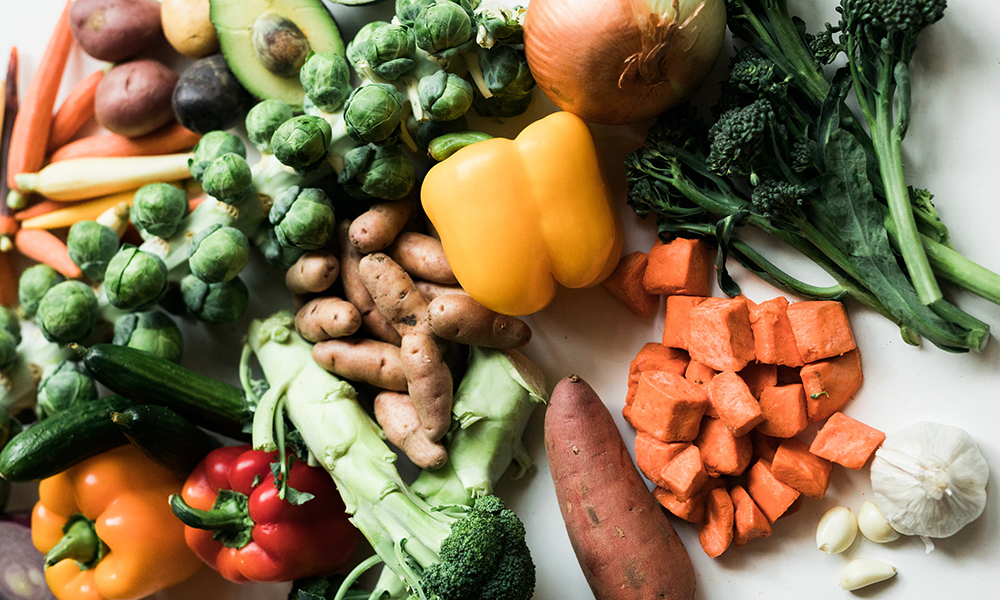
Essential vegetables to add to any well-rounded vegan grocery list include:
- Spinach
- Kale
- Romaine
- Chard
- Arugula
- Butter lettuce
- Tomatoes
- Carrots
- Cucumbers
- Celery
- Zucchini
- Bell peppers
- Broccoli
- Cauliflower
- Cabbage
- Brussels sprouts
- Radishes
- Beets
- Potatoes
- Sweet Potatoes
- Yams
- Plantains
While this is by no means an exhaustive list of every nutritious vegetable to consider adding to your vegan-friendly grocery list, these staples will get you started down the right path.
Nuts and Seeds
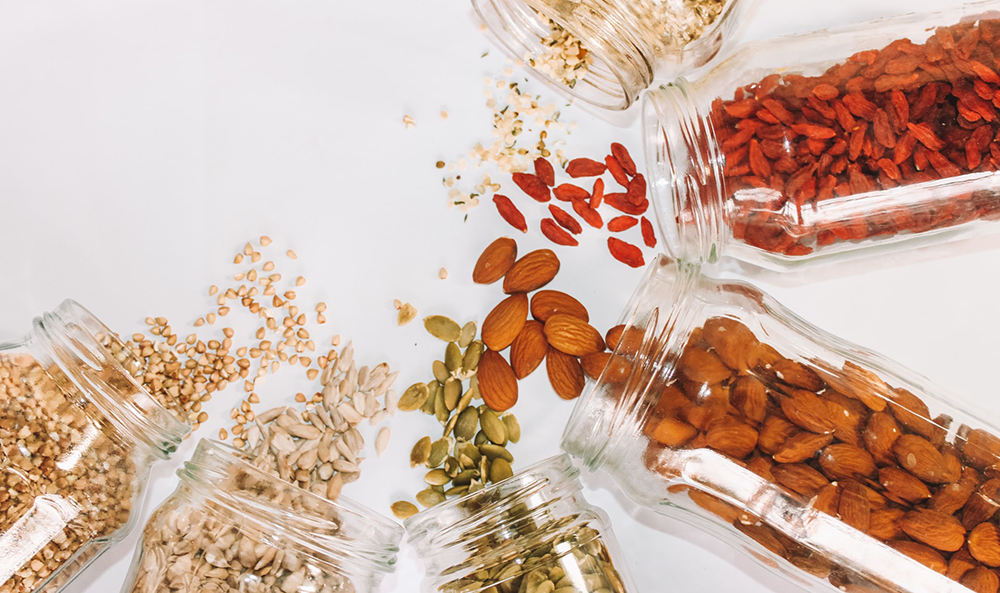
Nuts and seeds are so nutritious (hello, protein!) and add a ton of complexity, texture, and flavor to any meal. A few of my go-to’s:
- Sunflower seeds
- Hemp seeds
- Chia seeds
- Flax seeds
- Pistachios
- Almonds
- Cashews
- Walnuts
- Macadamia nuts
- Brazil nuts
- Pine nuts
- Almond butter (Whole Foods organic or Trader Joe’s organic)
- Peanut butter (Whole Foods organic or Trader Joe’s organic)
- Cashew butter (Whole Foods organic or Trader Joe’s organic)
A few of my personal must-haves that I eat almost every day: hemp seeds for smoothies, pistachios for salads and avocado toast, and blanched/Marcona almonds for salads.
Legumes (Dried and Canned)
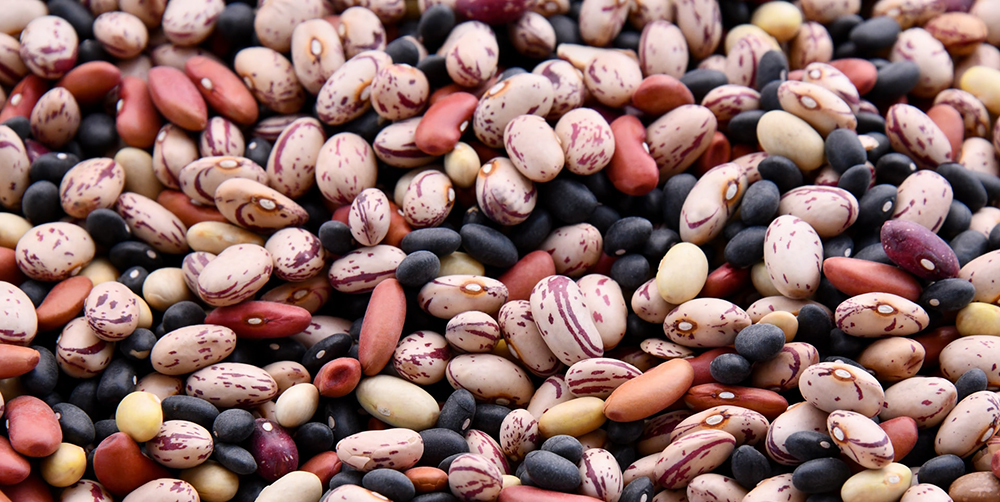
Legumes are an amazing plant-based food group that offers high levels of protein and versatility. They store well – whether canned, dried, fresh, or frozen – and are a staple in diets around the world for good reason. They’re inexpensive, filling, and so good for you. I always keep several of the below legumes on hand, and highly recommend adding a few of these to your vegan shopping list, as well:
- Green peas
- Black-eyed peas
- Garbanzo beans (chickpeas)
- Black beans
- Kidney beans
- Cannellini beans
- Navy beans
- Lima beans
- Fava beans
- Yellow and red lentils
- Green lentils
- French lentils
- Beluga or black lentils
Pro-tip: if you’re short on time, grab a few packs of the pre-cooked lentils from Trader Joe’s or Whole Foods. I love tossing these in salads for texture and added protein.
Grains
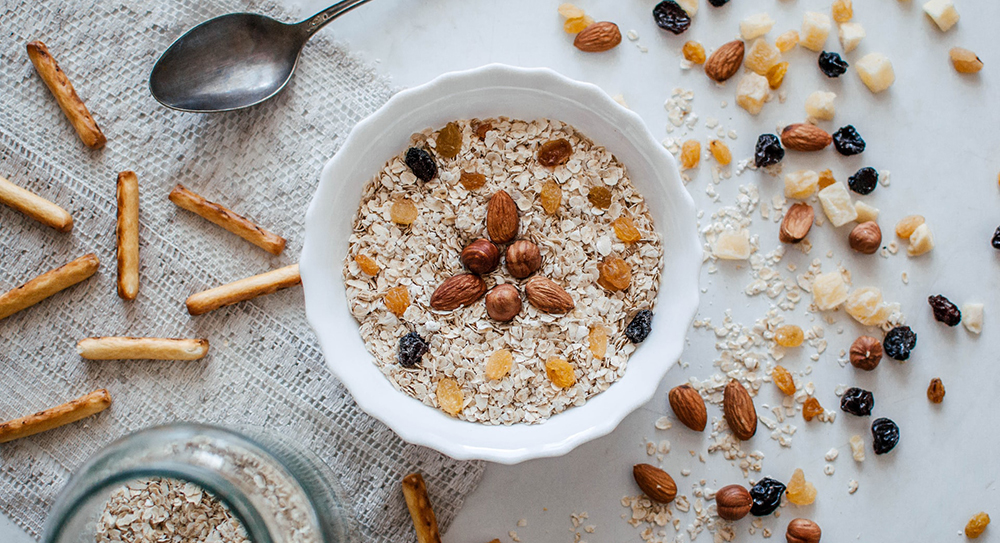
We’ve all heard that whole grains are crucial for heart health and digestion, but many low-carb fad diets have many people putting them in the “bad” category. But, here’s your friendly reminder that grains are your friend – in fact, they’re an essential part of a healthy diet and a huge source of energy that your body needs to thrive. Now, as for gluten: I try to follow the 80/20 rule with it, because my body tends to feel better with less gluten intake, but do what works for you! I include mostly gluten-free options below, but here are a list of my favorite grains to keep on hand:
- Quinoa
- Short grain brown rice
- Jasmine rice
- Basmati rice
- Gluten-free flour
- Buckwheat flour
- Teff flour
- Spelt flour
- Oats
- Barley
I’ll say it once, and I’ll say it again (and again, and again): quinoa is a perfect food. I make a big batch of quinoa on Mondays that I’ll continue to use throughout the week. I add it to salads, as a base in tacos, for grain bowls, and much more. Oh, and quinoa is a complete protein, is gluten-free, and leaves your body feeling super energized and satisfied while not weighing you down.
Plant-Based Vegan Meat and Egg Alternatives
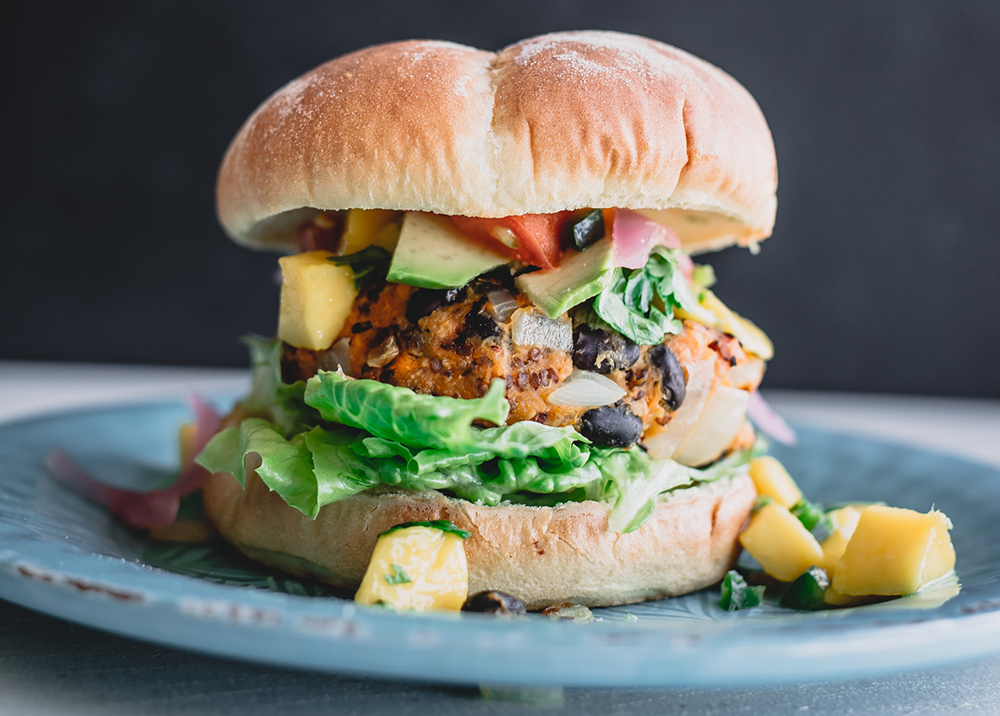
Here’s my take on plant-based meats: even as an omnivore, you wouldn’t eat a beef burger every day – right? For me, I take the same approach with alternative proteins; I think they’re a delicious treat and a fantastic bridge food for those who may be aiming to cut down on animal meats or dip their toes into a vegan diet. But, seeing as I aim to follow the 80/20 rule with more processed, “fun foods,” I’m not eating these items every day. Everything in moderation, as they say! But, that being said, I 1000% encourage people to enjoy these plant-based meats, and firmly believe that they are still far healthier for humans (and planet) than animal products.
- Beyond Beef (patties or ground)
- Beyond Sausage
- Impossible (beef patties/grounds, sausage, meatballs, and chicken nuggets)
- Lightlife (patties or sausage)
- Hilary’s Spicy Veggie Meatless Sausage
- Just Egg
- Bob’s Red Mill Egg Replacer
These are just a small glimpse of the incredible plant-based meat and egg options on the market now, and it’s really exciting to see so many new products being released every day.
Soy Products
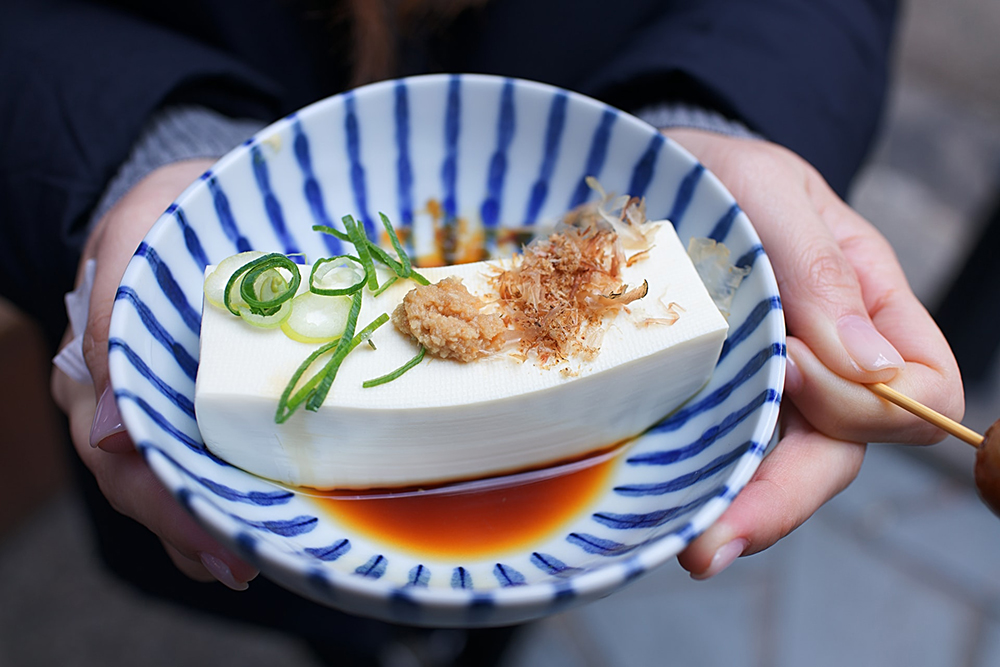
Soybeans are technically a member of the legume family, but they take on so many forms that I thought it would be worth carving out a separate category. A few soy powerhouse foods I like to keep on heavy rotation that you may want to add to your vegan shopping list:
- Edamame beans
- Tofu
- Soyrizo
- Miso paste
- Soy sauce or tamari
- Tempeh
P.S. – tofu and edamame beans are also complete proteins, folks!
Dairy Alternatives (Vegan Cheeses and Milks)
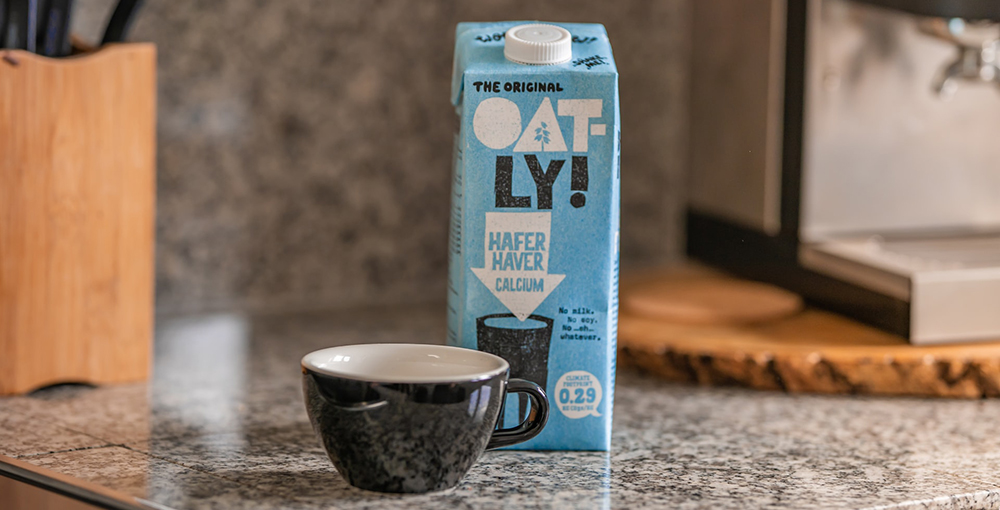
I’ve been on the dairy-free train for a few years because dairy just never sat well with my stomach, even before I went vegan. And there continue to be incredible vegan milk and cheese options that are coming out just about every day (we love to see it)! A few of my go-to dairy-free products to add to your vegan shopping list:
- Oat milk
- Almond milk
- Soy milk
- Macadamia milk
- Coconut milk
- Vegan butter (I love Miyoko’s)
- Cashew or coconut-based cheese (Follow Your Heart, Violife, and Daiya are all great)
- Plant-based cream cheese and sour cream
Some of my all-time favorites: Miyoko’s garlic and herb cheese wheels, Whole Foods plant-based gouda slices, and Oatly and/or Califia Farms’ barista blend for coffee.
Breads and Pastas
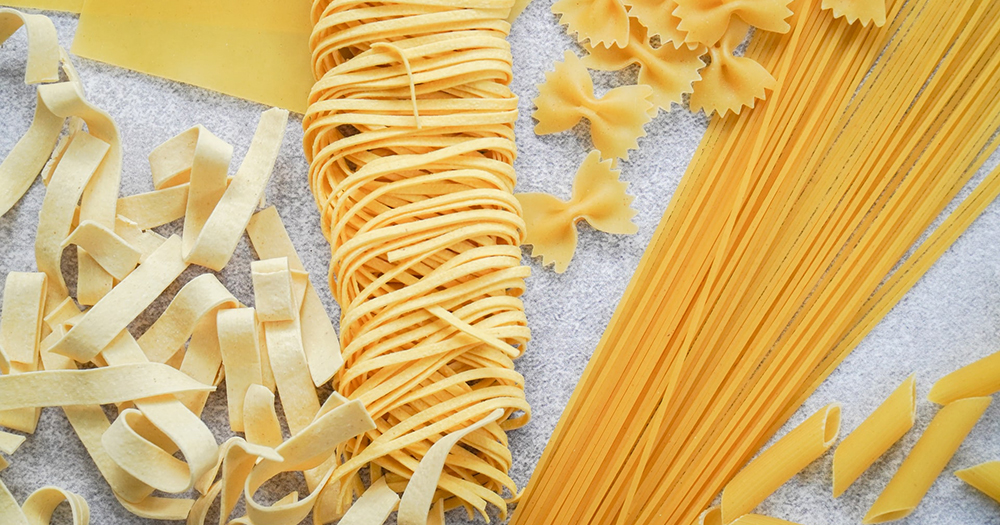
I’m a big bread and pasta girl, but as mentioned, I try to opt for gluten-free when possible. Below are a handful of my go-to’s that I always grab at the store, as well as some of my favorite brands:
- Gluten-free fusilli (Trader Joe’s)
- Gluten-free spaghetti (Jovial is a favorite for all gluten-free pastas)
- Gluten-free penne
- Gluten-free farfalle
- Gluten-free sourdough (Cook’s)
- Gluten-free bagels (Canyon Bakehouse)
- Gluten-free buger buns (Unbun)
- Gluten-free wraps (Udi’s)
- Banza chickpea-based pasta is also great!
There are SO many incredible vegan bread and pasta brands out there, so have fun experimenting with them! Pastas are always easy, inexpensive meals for busy weeknights, too – and remember that they don’t have to be heavy and indulgent if you don’t want them to be. I love a veggie-heavy pasta dish with sautéed zucchini, artichokes and onions – just add a light lemon and garlic sauce or a marinara and you’ll have a healthy meal ready in 20 minutes.
Condiments & Dips
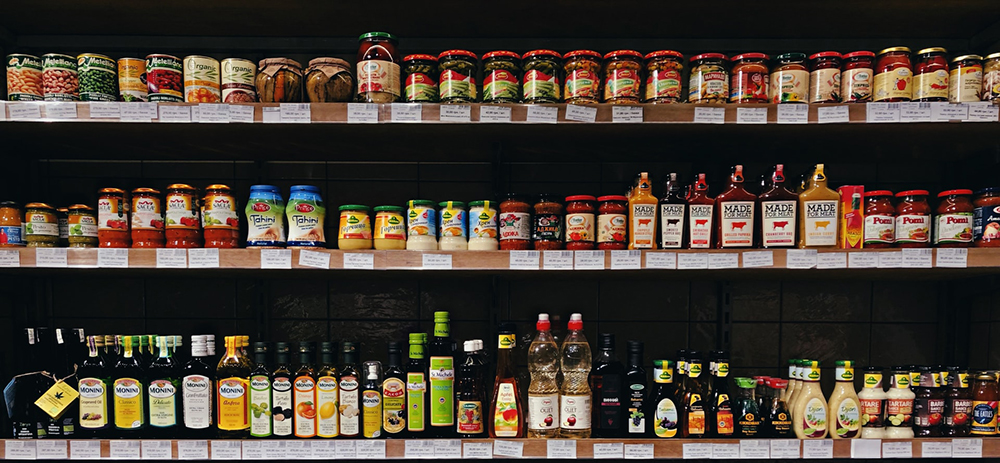
I always have a lot of condiments and sauce ingredients on hand so I can quickly whip up a tangy, flavorful marinade or dressing in a pinch. A few of the essential condiments to add to your vegan grocery list:
- Plant-based mayo (Primal Foods or Follow Your Heart are amazing)
- Dijon mustard (a must – for dressings, burgers, sauces, and more)
- Ketchup (I like Primal Foods for lower sugar – I promise, you won’t miss it)
- Pickles
- Balsamic vinegar
- White wine vinegar
- Rice vinegar
- Red wine vinegar
- Bitchin’ Sauce (I use this in everything, truly – and the Chipotle flavor remains my favorite)
- Hummus
- Garlic dip (I love Majestic brand, which you can get at Whole Foods and Erewhon)
- Olive tapenade (Trader Joe’s version is great)
I’m known for loving vinegary flavors (acid is an essential part of the flavor profile, right?) so I make sure I have pretty much every type of vinegar in my pantry at all times. This is of course extracurricular, but I also love sherry vinegar and champagne vinegar, too – they’re just so great for dressings.
Herbs and Spices
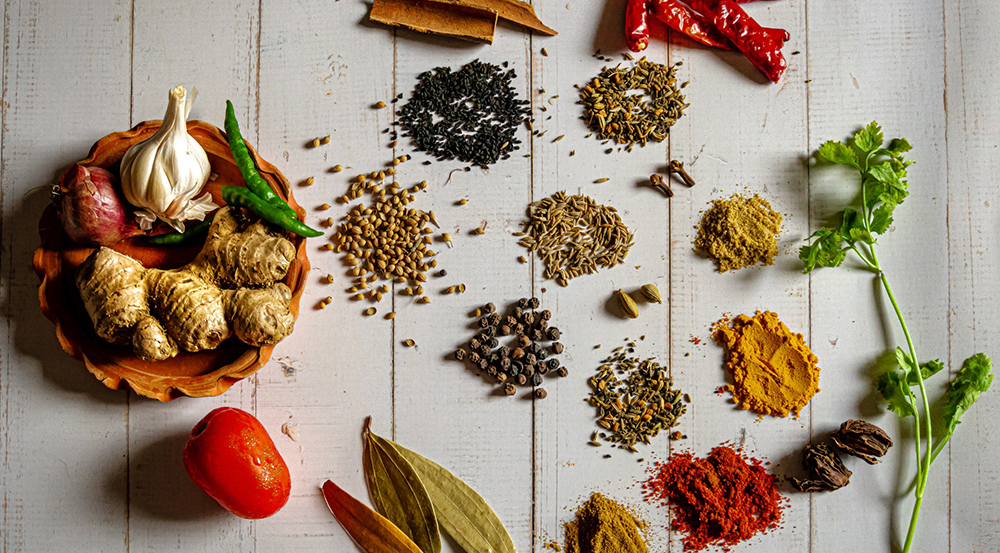
Like all cooking, herbs and spices are crucial elements in creating delicious flavor profiles, and with great spice pairings you can often cut down on salt quantities. A few of my must-have spices and seasonings:
- Garlic powder
- Onion powder
- Cumin powder
- Paprika (I’m partial to smoked paprika these days)
- Chili powder
- Curry powder
- Dried orgegano
- Dried basil
- Cayenne pepper
- Ground cinnamon
- Ground cloves
- Ground ginger
- Ground turmeric
- Bay leaf
- Black peppercorns
- Sea salt
- Umami seasoning (I love Mushroom & Company from Trader Joe’s)
- Everything But the Bagel (Trader Joe’s, obviously)
If you’re looking to get a little fancy, perhaps pick up some cardamom, sage, thyme, dill weed, or coriander, as well!
Oils
The ‘salt, fat, acid, heat’ formula applies to vegan food, too! Adding even a small amount of oil when cooking enables food to reach the perfect texture and flavor profile, and it’s important to include healthy fats in your diet for brain function, satiety, and beyond. Here are some vegan cooking oils that I always keep handy:
- Extra virgin olive oil
- Infused olive oil (garlic, truffle, etc.)
- Avocado oil
- Sesame oil (you can also make this at home in just a few minutes – check out Wandercook’s quick toasted sesame oil recipe)
- Coconut oil
- Grapeseed oil
- Vegetable oil
- Sunflower oil
- Flaxseed oil
Beverages
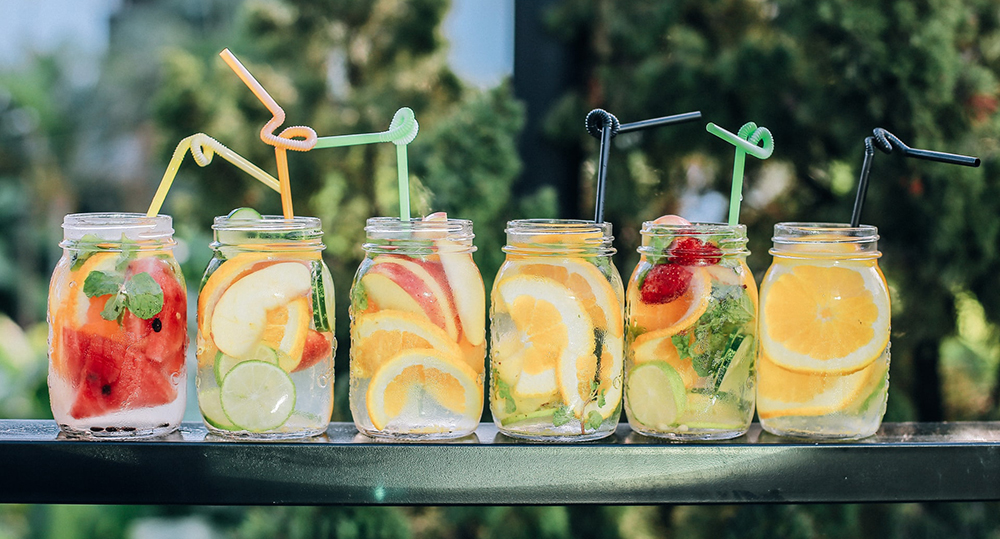
To be honest, I tend to be a bit boring when it comes to my beverages; most days I’ll sip on coffee in the morning and water throughout the day (sometimes green tea post-lunch). But, there are some super tasty vegan beverages I’ll pop open when I’m in the mood. If you’re a big beverage person, I recommend adding a couple of these to your vegan grocery list:
- Kombucha (Health-Ade is my favorite – get 30% off your first order)!
- New-school, healthy sodas like Olipop – (my favorite is the strawberry cream 🙂 get 15% off your first order with this link or code VEGANANJ15)
- Green tea or matcha (I love Traditional Medicinal’s organic teas – link below)!
- Black tea
- Chai tea
- Cold-pressed fruit and veggie juices
- Sparkling and infused waters
Use this link for 10% off your first order with e-mail subscription!
Particularly in the summer, I like to have more cold drinks on hand – some of my favorites this summer were strawberry Waterloo and blood orange Pellegrino.
Snacks and Treats
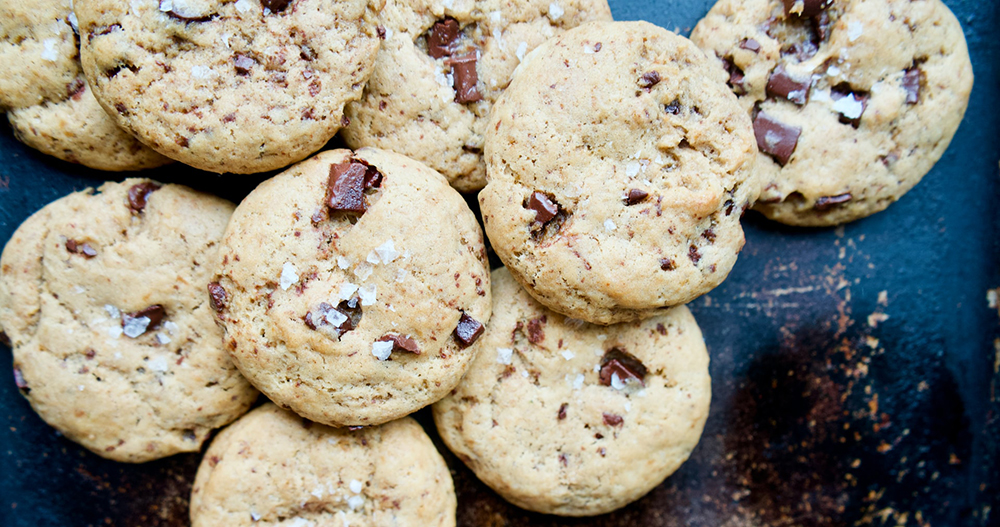
While I try my best to not keep a ton of processed snacks on hand, there are a few cleaner options that are more lightly processed while still hitting the spot when you’re craving something salty or sweet. A few of my favorite plant-based snacks to add to your vegan grocery list (I get a ton of these items at Thrive Market – be sure to take advantage of this discount code for 30% off your purchase and a $60 free gift when you join Thrive)!
- Purely Elizabeth Granola
- Simple Mills Gluten-Free Crackers (the Rosemary & Sea Salt are superb)
- Lundberg Farms Rice Chips (Fiesta Lime, Santa Fe Barbecue, and Honey Dijon)
- Late July Multigrain Chips (the Jalapeno Lime flavor tastes like Doritos)!
- Thrive Grain-Free Puffs (Barbecue and Nacho are incredible
- Lesser Evil Snacks (I love the Veggie Sticks – ranch flavor of course)!
- Health Warrior Bars (their chia seed bars are fantastic)
- GoMacro Bars
- KIND Bars
- Cybele’s Free to Eat Cookies (I love the Birthday Cake flavor)
- Partake Cookies
- Smart Sweets – I love their ‘Sweet Fish’ (a low-sugar, plant based Swedish fish gummy)
Again, these are all cleaned-up packaged foods that are great to have around as a bridge snack or whenever you need a little pick-me-up. I’m personally in need of a snack most days to hold me over until dinner, and I’ll often have the Simple Mills crackers with some hummus or Bitchin’ sauce.
Vegan Food Shopping Pointers (Tips for Your Trip to the Grocery Store)
When I go to the grocery store, I like to start in the produce section. Doing this has helped me re-frame my meals so that they’re built around vegetables and fruits; everything else is an addition or vehicle to amplify whatever produce the meal is centered on.
When you’re reviewing nutrition labels, a general rule of thumb for vegans is to look for the bold, often all-caps font just below the ingredient list. That’s where you can quickly determine if there are any dairy, eggs, or other animal products present.
In that vein – when buying packaged foods, the fewer ingredients, the better. Simple Mills is a brand that really takes home the ‘W’ for minimal ingredients, and they’re always a safe bet for extremely clean, plant-based snacks.
Interested in switching your pets to plant-based food? Check out my post on the best vegan dog food brands or try Purina’s vegetarian option for cats!
Discount Codes
THRIVE MARKET – Get 30% off your purchase & a $60 FREE gift when you join Thrive Market
INSTACART – Get 2 weeks of free delivery on Instacart
SPROUT LIVING PROTEIN – Get 20% off your order with code VEGANANJ20
EARTHCHIMP – get 10% off your order with code VEGANANJ
ORGAIN PROTEIN POWDERS AND SUPPLEMENTS – Get 20% your first order
TONE IT UP PROTEIN POWDERS – Get 10% off your order with code TONEITUP10
OLIPOP – Get 15% off your first order with code VEGANANJ15
HEALTH-ADE KOMBUCHA – Get 30% off your first order
TRADITIONAL MEDICINALS – Get 10% off your first tea order with email sign-up
Happy shopping!
At this point, you should be very well-briefed for your vegan grocery shopping trip. I’d love to hear how you fared or if you found any cool items that weren’t on this list, please let me know in the comments below! I’m constantly expanding my repository of pantry staples and would love to hear about any of your new discoveries. If you’re looking for more vegan inspo, check out Feedspot’s list of the best vegan blogs in California (yours truly is included)! 🙂

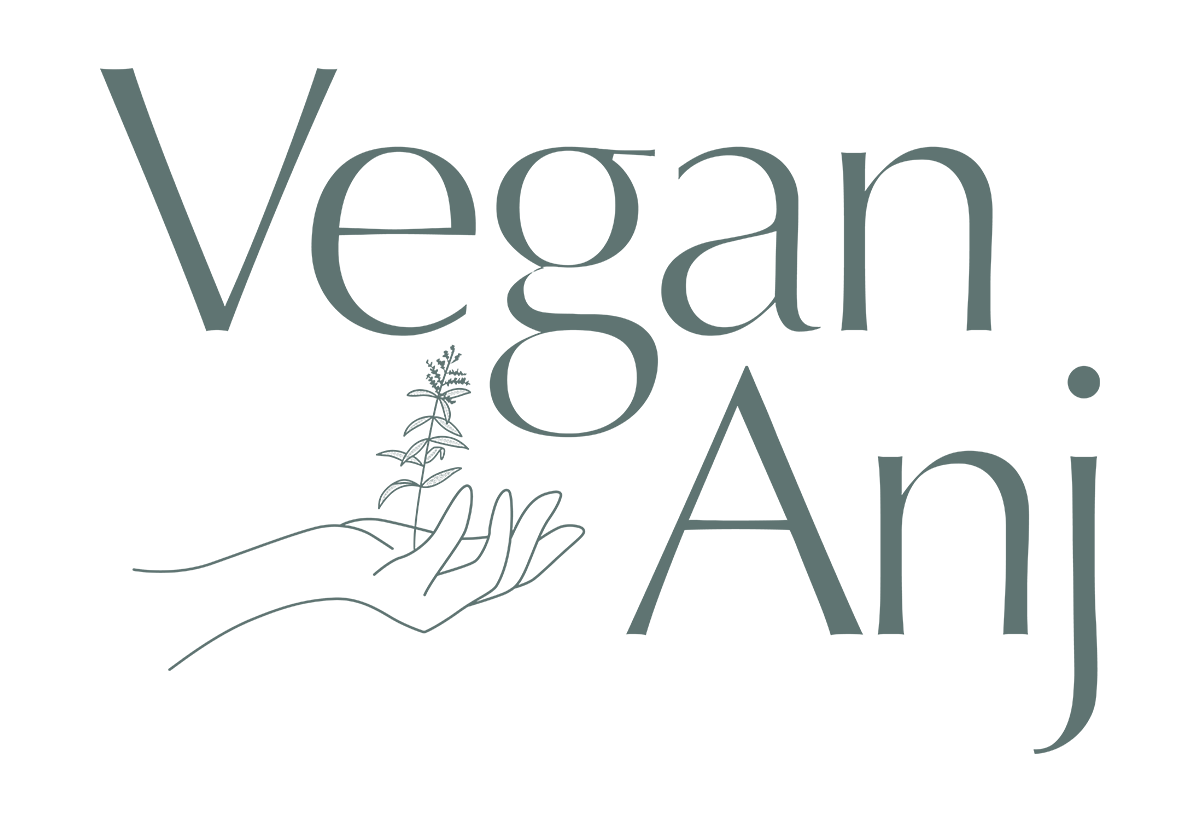




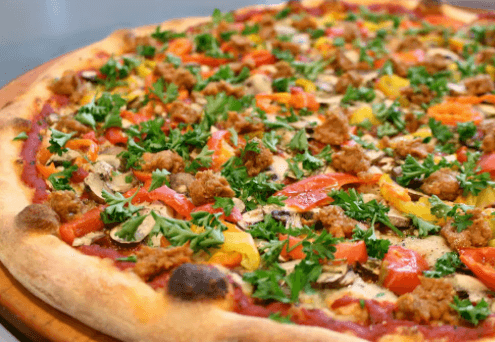
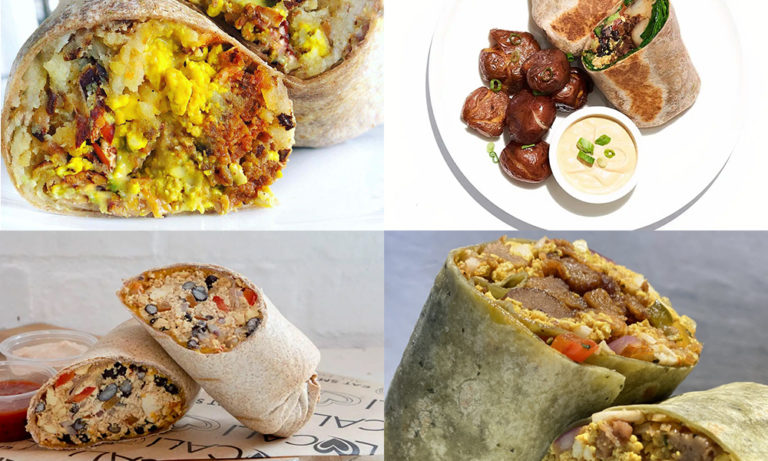

Great article and right to the point. I am not sure if this is truly the best place to ask but do you guys have any ideea where to employ some professional writers? Thx 🙂
Hello There. I found your blog using msn. This is an extremely well written article. I will make sure to bookmark it and come back to read more of your useful info. Thanks for the post. I will certainly return.
Thank you, Arreglos!
Anjelica,
Thank you for the assistance with making a shopping list. I am a little concerned that these things won’t be “filling” . I’m 329 lbs. and have a healthy appetite. Any suggestions ?
Hi Jay, thank you for your feedback and I completely understand your concern. That said, I always like to remind people that plants have protein! When you’re eating animal products, the animal is just the middle-man – because livestock, themselves, subsist entirely on plants. That being said, you can eat an extremely protein-rich, nutritious, and satiating diet while vegan. I recommend prioritizing protein-rich foods like tofu, tempeh, legumes, and nuts, and building your meals around those items with lots of veggies and healthy grains (quinoa is one that is a complete amino acid structure – i.e., a perfect protein source) or complex carbs (hello, sweet potatoes)! Also, don’t shy away from plant-based faux meats – brands like Field Roast, Impossible, Beyond make have delicious, high-protein vegan meat alternatives, as well. If you have any other questions, please let me know!
I am having a hard time finding things I can eat I have no bottom teeth I love nuts any suggestions
Hi Diane,
Thank you for your question and I’m sorry to hear about any difficulty eating you may have. I’d suggest soft foods like soups, smoothies, cooked vegetables, and grains. And, of course, tofu is very soft! Best of luck and be well.
I’m a beginner and this list help me a lot! Thanks for sharing!
Hi Anj,
This is a great article and very well organized to get the idea of vegan kitchen. I have one question about soy products. I hear in some research news and articles that soy can also be a carcinogen. Is that a real concern? Do you recommend any limit on how much soy one should consume daily?
Thanks
Viral
Thanks, Viral – so glad you found it helpful. The soy/cancer myth has been broadly debunked. In fact, you’ll see in this American Cancer Society article that, “the health benefits of soy outweigh any potential risk,” and that “there is growing evidence that eating traditional soy foods such as tofu, tempeh, edamame, miso, and soymilk may lower the risk of breast cancer.” The link is here for your reference 🙂 https://www.cancer.org/cancer/latest-news/soy-and-cancer-risk-our-experts-advice.html